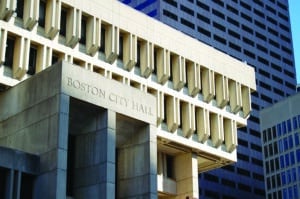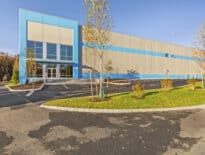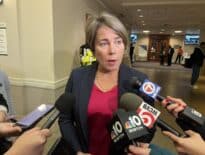The city of Boston’s Neighborhood Housing Trust Fund is contributing $69 million to 14 mostly-affordable developments across the city this year, Mayor Michelle Wu announced Friday.
The fund is filled by developers’ payments under the city’s affordable housing and “linkage” development impact fees, along with a mix of federal grants and Community Preservation Act dollars.
“These housing grants will strengthen our communities, enhance affordability, and continue to establish Boston as a home for current residents, families, and future generations. Thank you to the Neighborhood Housing Trust and the Community Preservation Committee for their partnership as we continue our efforts to build a Boston that is home for everyone,” Wu said in a statement.
The 14 developments were picked from a list of 24 submissions that had sought a total of $115 million, Wu’s office said. The winners were picked based on the city’s assesment of the development team’s ability to build, their project’s financial feasibility, the inclusion of women and people of color on the development team, community support and “market need,” the city said. In addition, buildings were required to follow the city’s new Zero Emissions Building requirements.
“Today’s funding will create 775 affordable homes for residents across the city. These developments are designed to offer residents stable and economically viable housing options and will assist us to meet our climate and equity goals,” Boston Chief of Housing Sheila Dillon said in a statement. “These funding awards will support the creation of rental, homeownership and supportive housing developments, catering to the diverse needs of the community.”
In addition to the 775 affordable units, around 50 market-rate units are included in the 14 winning projects:
- 95 Everett St., Allston: Developed by Penrose with 88 units, 73 of which will be reserved for people making 80% of AMI or below.
- Independence at the Navy Yard: Developed by the Planning Office of Urban Affairs and St. Francis House, with 48 units of supportive housing for women and veterans and 52 units for renters making 30 percent to 80 percent of area median income.
- The New North Building: Developed by the Planning Office of Urban Affairs and St. Mary’s Center for Women and Children, with 71 units for renters making up to 30 percent of area median income.
- 150 Centre St.: Developed by Trinity Financial, with 72 apartments for renters making between 30 percent and 120 percent of area median income.
- 247 Hancock St.: Developed by Arx Urban, with 35 units for renters making between 30 percent and 60 percent of area median income and 12 market-rate units.
- Hillsboro Live Work Condominiums: Developed by New Atlantic Development and the Humphreys Street Artist Studios community, with 21 new units for buyers making between 80 percent and 100 percent of area median income, with a preference for artists.
- 2 Shawsheen: Developed by the East Boston Community Development Corp., with 22 new units for renters with larger families making 70 percent to 100 percent of area median income.
- The Forbes Building: An existing, 147-unit mixed-income building being renovated to comply with the city’s rental building carbon emissions standards and with its affordability being preserved.
- Residences at Blue Hill: Developed by Lincoln Avenue Capitol with 41 units for renters making 30 percent to 60 percent of area median income.
- Tree House at Olmsted Village: Developed by 2Life Communities with 40 units for older renters making 30 percent to 60 percent of area median income.
- 30-36 Mildred Ave.: Developed by Norfolk Design & Construction and the Trustees of Reservations, with six new condominiums on four city-owned lots, for buyers making between 80 percent and 100 percent of area median income.
- Parcel 25 Phase 3: Developed by Mission Hill Neighborhood Housing Services, with 94 apartments for renters making 30 percent to 80 percent of area median income.
- 4200 Washington St.: Developed by Boston Communities with 27 apartments for renters making up to 60 percent of area median income and four market-rate units, plus retail space and a 2,500-square-foot community theater.
- Nehemiah at 157 Blue Hill Ave.: Developed by Nuestra Communidad and Pleasant Hill Missionary Baptist Church, with 26 apartments for renters making up to 60 percent of area median income.




 |
| 


